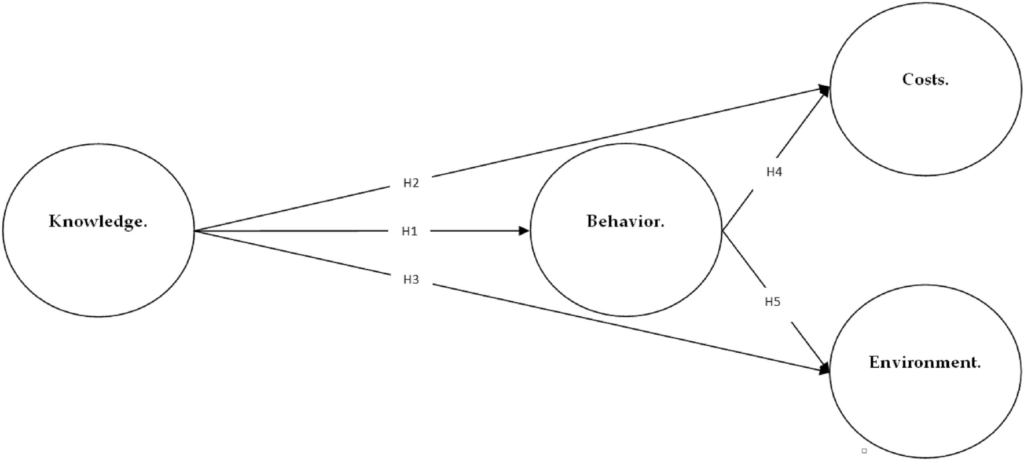Intelligent building technology seeks to find the balance between reducing energy consumption and providing the ideal environment for occupants. However, numerous studies from around the world have found that by simply equipping occupants with greater knowledge on their energy use, significant energy savings can be made from behavioral change alone.
This kind of ‘occupant development’ represents a paradigm shift in the way smart buildings could be designed and implemented. Rather than viewing occupants as a passive recipient of comfort and experience, or just a source of data collection, our future smart buildings should integrate the dynamic nature of user behavior as an intelligent building system that is capable of learning, improvement, and optimization.
Energy-Saving Behavior in an Intelligent Building
A 2023 study on user behavior in the workplace in Greece considered the topic from two different perspectives: personal vs. collective energy-saving actions. It found that an employee’s profile significantly affects their willingness to alter their personal energy-consumption behavior and help their organization conserve energy at work.
Moreover, they found that the willingness of employees to conserve energy at work is largely personally and not collectively ascribed, but highlight that the influence of the collective setting is highly significant.
“We have adopted a holistic approach with other researchers who stress that individuals do not typically act in isolation in the workplace but rather within groups, and, thus, the spotlight should also be aimed at their collective behavior and perceptions,” reads the paper. “We aspire to complement sparse research on organizational settings and demonstrate how collective efficacy influences the personal efficacy of energy behaviors observed by peers in the workplace.”
The study concluded that employee willingness to help the organization conserve energy is most strongly affected by the typical level of personal energy-saving norms in the workplace, as well as awareness of energy wastage and knowledge of practical solutions. The researchers found that energy-saving personal norms can be leveraged in organizational settings with greater knowledge of energy use to directly affect employee personal energy-saving intentions.
Interestingly, the study also found that engagement towards pro-environmental behavior tends to increase with age, while women tend to have stronger environmental attitudes and behaviors than men across all age groups. This suggests that having more women in roles that can have greater influence on workplace culture and energy-related behavior would be a positive change from an environmental or cost-saving standpoint.
A 2019 workplace study in China draws on stimulus-organism-response theory (SOR) to explore the impact of circumstance stimulus and internal psychological states on an employee's energy saving intention. Using partial least square analysis the researchers found that descriptive norms, organizational energy saving culture, as well as various forms of media (the stimulus) had a significant direct and positive impact on employee’s perceived energy saving responsibility and social pressure (the organism).
Similar to the previous (newer) study in Greece, this research found that employee’s perceived energy-saving responsibility and social pressure had a significant positive impact on energy saving intention (the response). The study drew theoretical implications for future energy saving research as well as managerial implications for organizations and policymakers that push beyond the typical view of energy related occupant behaviors as a static aspect of building optimization.
“The value of historical studies has been restricted because they did not account for the possibility that employees’ energy saving behavior may change over time, depending on the particular circumstances they are experiencing,” explains the study. “Such within-person variance has already been shown for determining employees’ behaviors, such as job satisfaction, organizational commitment, job performance, and turnover, but not for energy saving characteristics.”

Energy-Saving Behavior at Home
A 2024 study published in Nature Journal sought to comprehend how household energy management knowledge affects energy usage, user behavior, related expenses, and environmental effect in residential buildings in Palestine.
Using a survey and partial least squares structural equation modeling (PLS-SEM) alongside the Preacher and Hayes method, the researchers developed a compelling visual model to account for energy-saving behavior in relation to knowledge, cost, and the environment.

In the model, energy-saving knowledge builds off cost and environmental concerns to influence behavior, which in turn influences the real-world impact on energy costs and environmental performance.
The findings of the study ultimately revealed that better dissemination of information can lead to significant changes in resident behavior, resulting in reduced expenses and a more positive impact on the environment. The study “emphasizes the importance of a comprehensive approach involving education, feedback, and effective policies to achieve sustainable results.”
Another interesting residential study, by the University Institute of Lisbon in 2023, focused on long-term energy savings through user behavior modeling in smart homes and how initial energy-saving behavioral improvements diminish over time.
To address this decline, the study introduced full-color smart home dashboards with 3D representations and mobile connectivity to test participants on sustained system interaction and engagement, as well as energy-saving behavior.
Overall, the average energy consumption was reduced by 19% through the introduction of a more engaging user interface. More importantly, the approach sustained user engagement over time, with users actively participating in energy conservation efforts far beyond the typical baseline. A survey of the participating household provided insight into the user acceptance side of the discussion, where:
- 69% considered the approach more attractive than existing market solutions
- 79% considered it more useful than existing solutions
- 81% of the participants strongly or totally agree that it can change users’ behaviors
“Monitoring systems for energy savings have a clear positive impact on household energy usage; however, after some time, people tend to lose interest, and behavioral changes are only temporary,” the study explains. “We believe that it is essential to provide tools such for people to perceive data, understand how to use it and develop sustainable behaviors that can proliferate throughout the community.”
The Study of Energy-Saving Behavior
Research on the energy-saving behavior of various building occupants is still in its infancy but even early results make it clear that the ability to influence that behavior has huge potential for energy conservation.
Driven by the rise of energy data collection across smarter commercial and residential real estate, we will soon be able to understand and harness the power of occupant behavior to reveal a new world of energy-saving opportunities in buildings.
The underlying message from new research around the world is that; knowledge is power-saving in an intelligent building. By providing users, whether they be employees, residents, and guests, with more knowledge of how their energy is being used and wasted, you enable those with the desire to save energy and encourage those that don’t.
This result is only likely to get more pronounced as younger, more environmentally conscious generations begin to dominate the workforce. User behavior might just be the next best intelligent building system for energy management.



